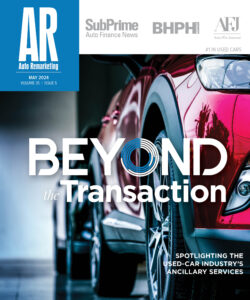S&P/Experian: June Auto Loan Defaults Tick up Marginally
NEW YORK — Coming off of the lowest rate seen in the
eight-year history of the index, the auto loan default rate increased
marginally in June, according to the S&P/Experian Consumer Credit Default
Indices released earlier this week.
Data compiled by S&P Dow Jones Indices and Experian
showed the auto rate ticked up to 1.04 percent in June from 1.03 percent in
May. The level still demonstrated marked improvement from a year earlier when
it was 1.29 percent.
While auto loans sustained the slight uptick, analysts found
that most loan types saw a decrease in default rates and many for the sixth
consecutive month. They added four loan types posted their lowest rates since
the end of the recession.
S&P and Experian discovered the national composite
declined to 1.52 percent in June from its 1.62 percent May rate.
The first mortgage default rate dipped from May's rate 1.50
percent to June's level of 1.41 percent. The second mortgage default rate
declined from 0.88 percent in May to 0.73 percent in June. Bank card default
rate dropped to 3.9 percent in June from May's reading of 4.35 percent.
"June 2012 data continued a positive trend in consumer credit
quality," said David Blitzer, managing director and chairman of the index committee
for S&P Dow Jones Indices.
"Consumer default rates are falling and we are approaching new
lows across most loan type," Blitzer continued. "In the last recession most
default rates peaked in the spring of 2009; since then the decline has been
bumpy but consistent.
"The first mortgage default rate fell by 9 basis points to
1.41 percent in June, and is now back to its May 2007 level," he went on to
say. "It had reached a high of 5.67 percent in May 2009. The second mortgage
rate also fell during the month, by 15 basis points, and is at an eight-year
historic low. The bank card rate dropped by 38 basis points, and is at its
lowest since the end of 2007. The auto loans default rate is only 1 basis point
above last month's historic low."
Looking at the data by geography, Blitzer highlighted that four
of the five cities included in the indices posted a default-rate drop to settle
at post-recession lows.
For the sixth consecutive month, Chicago declined, moving
from 2.84 percent back in December to 1.84 percent in June.
"That's a 1-percentage-point drop and its lowest rate since
August 2007," Blitzer noted.
Miami fell for the
fifth consecutive month, dropping 11 basis points from May's reading of 2.55 percent
to June's mark of 2.44 percent.
"This is the lowest rate for Miami since October 2006,"
Blitzer pointed out. "The high for Miami was 18.9 percent in June 2009, just
three years ago."
Furthermore, Dallas hit its lowest rate in eight years,
moving down by 7 basis points from 0.94 percent in May to 0.87 percent in June
and retains the lowest rate among the five cities S&P and Experian follow.
Finally, Los Angeles saw almost a quarter-percentage-point decline from 1.82 percent in May to 1.60 percent in June, while New York
increased by 3 basis points month-over-month, from 1.61 percent in May to 1.64
percent in June.
"There is only positive news in June's numbers," Blitzer
declared. "In the past three years, households have come a long way in
repairing their balance sheets. Looking across our 10 headline indices, only
one — bank cards — shows default rates above 2.5 percent and even those are
close to their eight year historic low."
Jointly developed by S&P Indices and Experian, Blitzer
reiterated the S&P/Experian Consumer Credit Default Indices are published
monthly with the intent to accurately track the default experience of consumer
balances in four key loan categories: auto, bankcard, first mortgage lien and
second mortgage lien.
The indices are calculated based on data extracted from
Experian's consumer credit database. This database is populated with individual
consumer loan and payment data submitted by lenders to Experian every month.
Experian's base of data contributors includes leading banks
and mortgage companies and covers approximately $11 trillion in outstanding
loans sourced from 11,500 lenders.

 View The Latest Edition
View The Latest Edition

